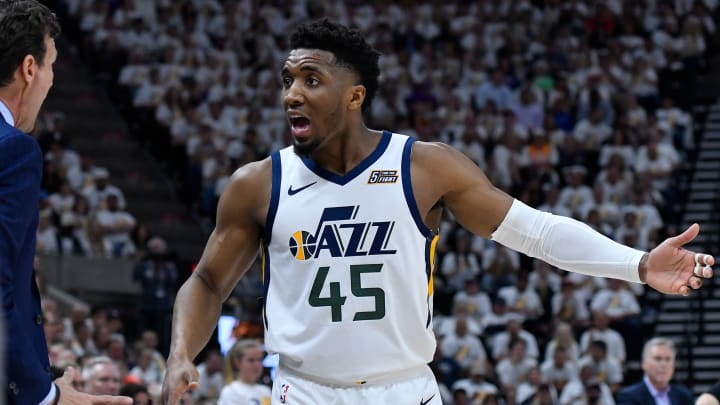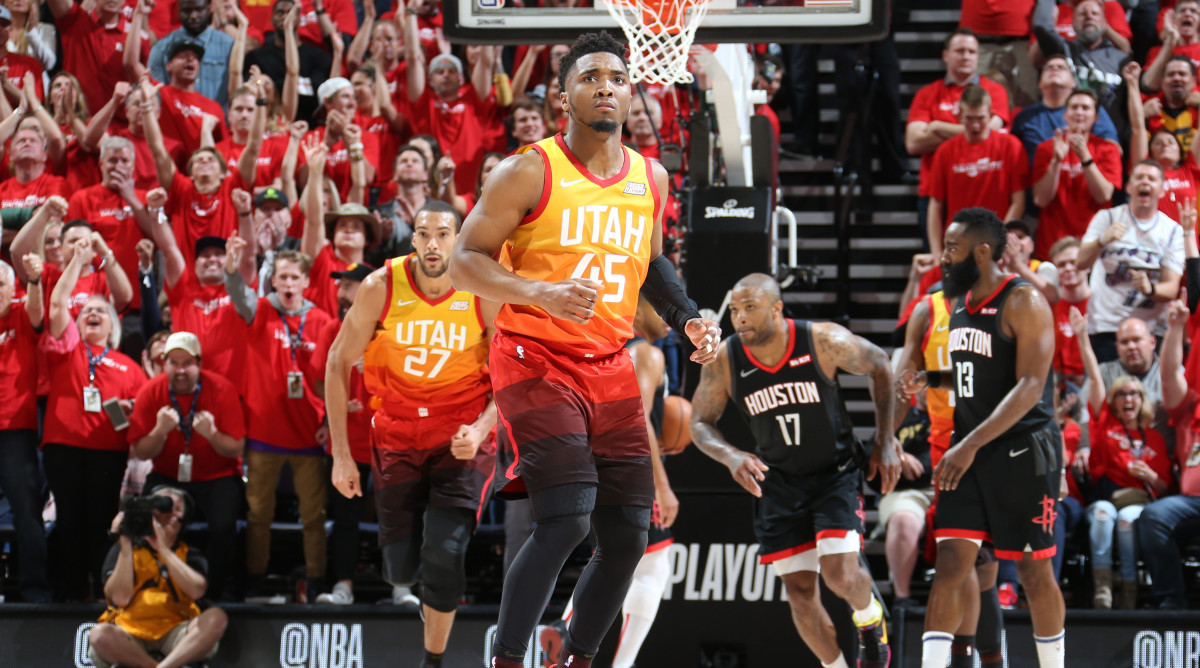Donovan Mitchell, Jazz Future in Flux After Quick NBA Playoff Exit

Even amid a quick first-round exit against the Rockets on Wednesday night, it’s hard to frame Utah’s last two seasons as anything other than a marked success. Gordon Hayward fled to Boston in July 2017, leaving the Jazz with no lead option and their eyes firmly on the lottery. They entered last season with Rudy Gobert, Ricky Rubio and a rookie guard out of Louisville. The rookie, Donovan Mitchell, proved to be pretty damn impressive.
The Jazz now bow out of the 2019 playoffs with 98 regular-season wins and a playoff series victory over Russell Westbrook and the Thunder since 2017-18. They remain a staunch defensive unit and a near-lock for the 2020 postseason. But as we turn to year three of the Donovan Mitchell era, a critical question has emerged: Can this Jazz core ever evolve into a true contender for the West crown?
There’s an argument to be made that the Rockets were simply a bad matchup for Utah, an unfortunate buzzsaw capping Mitchell and Co.’s ceiling in each of the past two springs. James Harden is perhaps the league’s most unguardable player, controlling each contest he enters, even during a near-historic cold streak in Game 3. Chris Paul has been at full health in each of the past two series against Utah, and Houston’s length and switchability even limited the Warriors last year. There’s no shame in falling short against The Beard.

Yet it’s hard to shake the feeling that Houston revealed a deeper set of flaws on Utah’s roster, especially on the perimeter. Mitchell is the only creator who can score. Ricky Rubio was exposed against Houston, looking increasingly like a relic of a bygone era. Joe Ingles went just 8-29 from three in the first round. Royce O’Neale, Jae Crowder and Kyle Korver are all complementary parts, and the Dante Exum Fan Club is hemorrhaging members by the season. The alternate reality of a healthy Hayward paired with Mitchell is tantalizing. Paul George would have been a perfect fit, and he’d like have fewer headaches in Salt Lake City. Daydreams aside, Utah is currently bereft of wing talent.
With limited perimeter options aside from Mitchell, Utah’s ascendance to a potential contender entering the season largely hinged on Rudy Gobert. The 7’1” Frenchman won Defensive Player of the Year in 2017-18, leading the league in blocks the year prior. Gobert made a major offensive leap this season, leading the NBA in field goal percentage and slamming everything in sight. He tallied a league-best 306 dunks, more than double his total in 2017-18. Gobert’s offensive uptick should have theoretically boosted Utah up the Western hierarchy. The results didn’t match the hypothesis.
The Jazz performed worse with Gobert on the floor this season compared to 2017-18. Utah was plus-9.5 points per 100 possessions with Gobert last year. That mark dipped to plus-6.9 points per 100 possessions in 2018-19. A defensive dip is the central culprit, with Gobert’s defensive rating rising from a dominant 97.4 last year to a solid 102.9 this season. The change wasn’t drastic, but it was noticeable. Gobert slipped defensively this season, a touch slower rotating for blocks, more succeptiable to losing a guard on the perimeter. Harden and Paul took similar advantage this postseason. Utah’s limited scoring erases margin for error on the defensive end. A slight downturn from Gobert made a significant impact.
We’ve noted Utah’s shortcomings throughout the roster, so what about the superstar himself? Mitchell’s ascendance was rapid as a rookie and he wasn’t necessarily an earmarked talent, sliding to the No. 13 pick. Detroit took Luke Kennard at 12 and the Knicks opted for Frank Ntilikina at nine. But Mitchell entered Salt Lake City with the air of an All-Star. Hayward’s departure wouldn’t cripple the franchise, not with a fearless scorer wise beyond his years. By December, Mitchell was earning praise from NBA luminaries. In April, he sent Russell Westbrook packing. Big things were expected out of the gate in year two.
Mitchell struggled at the start of the season, and he’s admitted as such. Mitchell shot just 29.1% from three before New Year’s Day, averaging just 3.4 assists per game in the process. Regression had set in. His last 30 games were terrific—25.7 points per game, 41.4% from three, 21 wins—but similar habits resurfaced in the postseason. Mitchell’s jumper abandoned him and stubbornness set in. He made just 11-of-43 triples against Houston and shot an abysmal 32.1% from the field. Game 5 featured a 4-22 effort, in which he was 0-9 from three. Game 3 included 9-27 from the field and a missed game-tying three. Deciphering the real Mitchell is a difficult task.
It’s unfair to a degree to scrutinize Mitchell so early in his career. The expectations aren’t high for late lottery picks. The past five selections at No. 13 prior to Mitchell were Georgios Papagiannis, Devin Booker, Zach LaVine, Kelly Olynyk and Kendall Marshall. Booker still gets the benefit of the doubt and Papagiannis is now with Panathinaikos. It’s a testament to Mitchell’s stellar first two seasons that he’s earning criticism at all.
Such is the burden worn by an emerging star, but the conversation must be had nonetheless. Can Mitchell reasonably lead Utah from early exit to Finals contender? Year three will be a critical one. Mitchell’s jumper needs to stabilize, and some of the headstrong drives should be replaced by heady dimes. The best version of Mitchell arrived late in the regular season and Utah thrived. He’ll need to deliver the same performance in the next postseason for Utah to be taken seriously out West.
